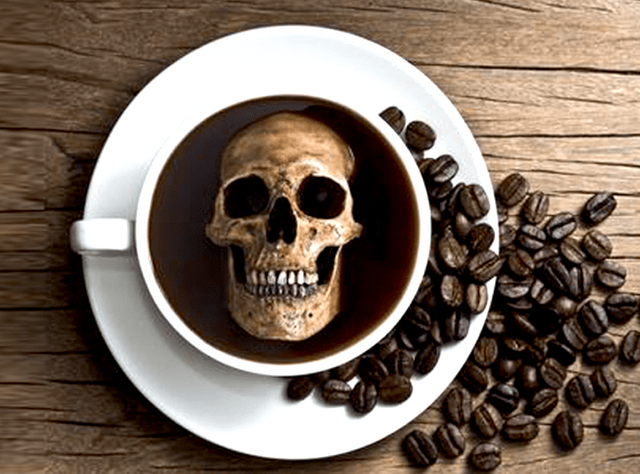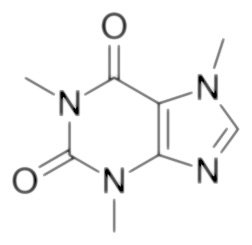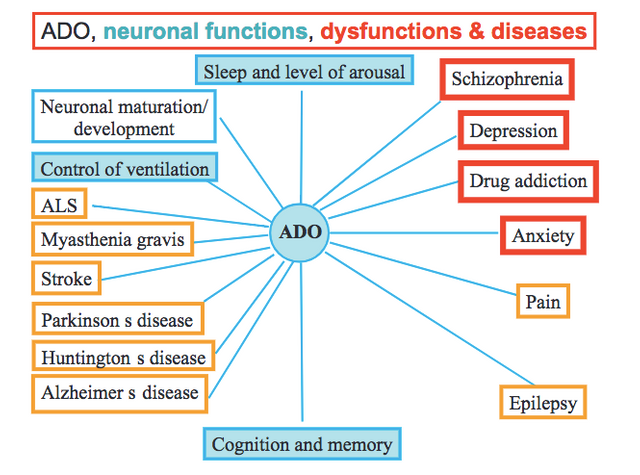
I got really sick recently so I thought it would be a good time to quit caffeine (1,3,7-trimethylxanthine). I made it about 85 hours and thought I’d remained strong until I realized Pepsi contained caffeine. Shit yo, caffeine is hard to avoid. Now I’m drinking my first cup of coffee in four days, and I’m enjoying it.

I am trying to convince myself that my relapse is acceptable. So here are some good thoughts to have while you drink your coffee.
According to Elmenhorst and his colleagues (2012), there is significant evidence that caffeine prevents neurodegenerative diseases such as Alzheimers or Parkinson’s when consumed in moderate doses (3-5 cups per day) during mid life. The typical dose of caffeine occupies a high percentage of A1 adenosine receptors, which in turn leave researchers to believe that adenosine plays a role in neurodegenerative disorders.
Mechanistically, caffeine poses the majority of its biological effects via antagonizing adenosine receptors (A1, A2A, A3, and A2B) which in turn effects neurons and glial cells. Adenosine is thought to be a sleep regulating factor and it’s believed that it works as a “neuroprotector” against energy depletion. Anyone who drinks coffee knows that caffeine enhances more than just our energy levels; adenosine receptors influence many brain functions as well as dysfunctions and diseases:

(ADO= adenosine. Photo credit goes to Ribeiro and Sebastiao. Check out their review, it's mad thorough!)
Caffeine is arguably the most commonly consumed food based psychoactive drug throughout the world, and has been for thousands of years. It naturally occurs in the leaves, seeds, and fruits of many plants. The average adult in the U.S. consumes about 200mg. The chemotherapeutic mechanisms of caffeine are currently undergoing investigation:
Caffeine has presented induction of apoptosis. There are two ways in which a cell can die: apoptosis or necrosis. Necrosis occurs as a result of external damage, risking inflammation. Apoptosis is more like.. well, cell suicide; it’s a cleaner and more efficient programmed cell death. Caffeine also prevents drug efflux from other cells, so in other words it prompts drug resistance. At micro-molar doses, caffeine has been shown to promote anti-tumor immune response by way of A2 Adenosine receptors, and it inhibits tumor angionesis (which is process where new blood vessels form from pre-existing vessels) by antagonizing adenosine receptors. It is a dose of low, non-toxic concentration that has been shown to have anti-tumor immune responses; this is exiting because it could be a novel approach of cancer treatment.
Elmenhorst, D., Meyer, P. T., Matusch, A., Winz, O. H., & Bauer, A. (2012). Caffeine occupancy of human cerebral A1 adenosine receptors: in vivo quantification with 18F-CPFPX and PET. Journal of Nuclear Medicine, 53(11), 1723-1729.
Ribeiro, J. A., & Sebastiao, A. M. (2010). Caffeine and adenosine. Journal of Alzheimers Disease, 20 Supplement 1, S3-15.
Tej, G., & Nayak, P. K. (2018). Mechanistic considerations in chemotherapeutic activity of caffeine. Biomedicine & Pharmacotherapy, 105, 312-319.
If you use the steemstem tag on your science related posts, they might get some more views and votes. It is what a lot of people on here use instead of 'science.'
Downvoting a post can decrease pending rewards and make it less visible. Common reasons:
Submit
Thanks for having my back veckinon, you're the man!
Downvoting a post can decrease pending rewards and make it less visible. Common reasons:
Submit
Keep it up. You've got some really cool posts.
Downvoting a post can decrease pending rewards and make it less visible. Common reasons:
Submit
Good tip.
Downvoting a post can decrease pending rewards and make it less visible. Common reasons:
Submit
Eye'm addicted.
Downvoting a post can decrease pending rewards and make it less visible. Common reasons:
Submit